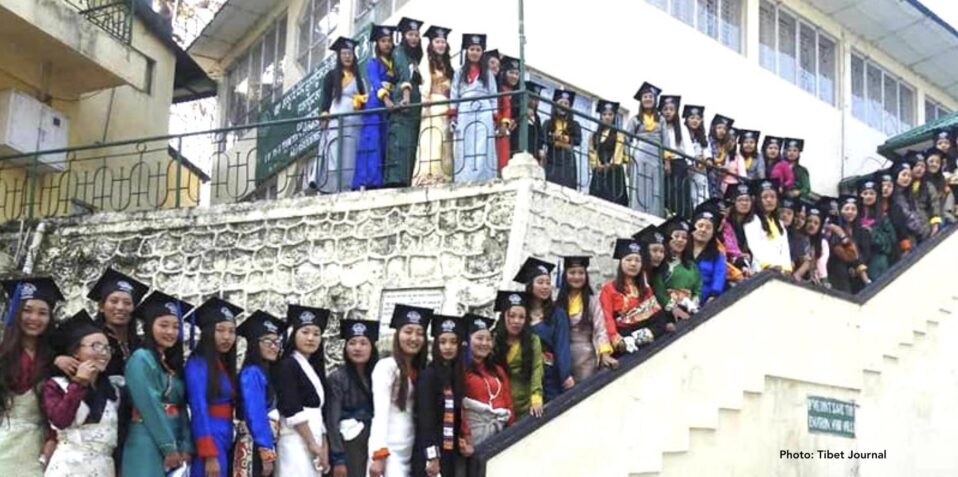ENGLISH ACQUISITION IN TIBETAN SCHOOLS IN EXILE
This project will be a collaboration between Tibetan Children’s Education Foundation (TCEF) and the Department of Education (DOE) of the Central Tibetan Administration (CTA), Dharamsala, India. The DOE oversees the education of approximately 24,000 Tibetan students attending 74 schools in exile. More information on the DOE is available at www.sherig.org
STATEMENT OF NEEDS
The overarching linguistic objective of Tibetan education in exile is to guarantee all Tibetan students bi-literacy and bilingualism in both the Tibetan and English languages. Achieving this aim increases the likelihood that Tibetan children receive an education that will lay the foundations for them to learn about their special cultural heritage and receive a high-quality, modern education so that they will be successful in an ever-changing world.
Based on research that we have conducted so far, there is great scope to improve instruction methods and technologies in Tibetan schools in exile. This project will greatly improve the acquisition of English Language and literacy for thousands of Tibetan students in exile by training their teachers in best current practices of Language acquisition based on the research.
Saving Tibetan Culture
Tibetans are going through one of the bleakest periods in their history. The current situation of Chinese occupation and domination threatens the very survival of the Tibetan people and their culture. Many Tibetans believe that whether they and their culture can survive this period or not will depend on the Tibetan children and the quality of future Tibetan citizenry. Back in Tibet, the kind of education that Tibetan children are receiving inspires no confidence. Chinese is the medium of instruction with little importance attached to the study of the Tibetan language and its culture. The professed aim of Tibetan education in Tibet is to foster a sense of loyalty to China and to the Communist party. In this context, Tibetan education in exile assumes great importance for the very survival of the Tibetan culture. It is vital for Tibetan children in exile to receive an education that grounds them in their culture and, at the same time provides them with the tools for success.
Academic & Professional Success
Tibetan students need English proficiency to help succeed academically. Tibetan Education in Exile operates within the constraints of living in exile. The medium of instruction switches from Tibetan to English either from grade 6 or grade 8. From then onwards, the medium of school education is English. Proficiency in English is absolutely vital for them to succeed and get good grades in school and, this in turn, can lay the foundations for their success in college education.
The medium of college education in most school, certainly the ones that the Tibetan students are likely to enroll is English. On top of that, college education and admission is very competitive.Excellent school grades are required for admission into good colleges, and as we reiterated before English proficiency is key to great school grades.
It is because of this reason that millions of Indian families spend vast sums of money to send their children to the best English medium private schools. While few Tibetan families will have funds to do that for their children, the English Acquisition Project, we hope can provide Tibetan students this vital tool of English proficiency to help them succeed academically at both the school and the interlinked college levels.
Academic success, graduate and post graduate degrees are the keys to ensuring professional success for Tibetans, both within their exiled communities and the larger Indian society that they live in. English is the dominant economic language in India. Proficiency in it provides Tibetan students required skills in interviewing, communication, public speaking – all tools that can help them to succeed professionally.
Sharing Tibetan Culture
In addition, many Tibetans believe that Tibetan education in exile must help to keep Tibetan history and culture alive in the global consciousness. It is largely feared that with every passing year, the current condition of Tibet and Tibetans, as well as the historical events of 1959, fade further away from people’s awareness. Tibetans must now become the best spokespersons for Tibet, the ones trying the hardest to keep Tibet and the Tibetan situation alive. Because English is largely regarded as an international language, the younger generation of Tibetans must have the required proficiency in English to tell the world about their homeland. Their education combined with fluent English proficiency will enable them to find platforms from which they can speak eloquently to keep their culture and its history alive in people’s hearts. Even if the majority of Tibetan students cannot become spokespersons for their culture from behind a microphone, in today’s world almost all of them can become a spokesperson from behind a computer keyboard! Thus, for the Tibetans, education and English proficiency are not only tied to gaining individual success but also integral to the process of saving a culture.
Phase 1: Exploring Collaborations and Making Connections
The seed of this project was sowed almost three years ago with a series of e mails between TCEF Executive Director Karma Tensum and Sara Buckerfield, an expert in Language Acquisition. Sara is the owner of an educational consultation firm and has worked extensively in the states of California, Oregon, and Arizona as a consultant and teacher-trainer in English acquisition, literacy, and instructional methodology. Buckerfield ‘s resume and other supporting documents about her work are attached. Karma Tensum has a Masters in International Education from Harvard Education School and has helped to draft the first Tibetan National Education Policy Document in exile. Currently, he serves as a member of the Education Advisory Committee for the DOE, comprising of experts from all over the world.
Their communications culminated in an invitation to Sara Buckerfield to travel to Montana in the summer of 2011 to meet the TCEF board of Directors and for her and Karma to present the project to the board, and to get formal board approval for this project. Equally important, Sara has been able to set aside two blocks of time in October 2013 and April 2014 for project work.
In February 2012, Karma Tensum had a meeting with Dr. Lobsang Sangay, the elected leader of the Tibetan people in exile, who is also the Kalon or Minister for Education, to discuss and explore interest from the side of the Tibetan Department of Education, Dharamsala, India.
In April 2013, Karma Tensum had another meeting with Mr. Ngodup Tsering, the Education Secretary, DOE, Dharamsala to lay the ground work for phase 2 of the project and to firm up collaborations.
In August 2013, the TCEF board approved the formation of an advisory group of experts to specifically help with this project. Bio datas of members of the advisory group are attached separately.
Phase 2: Understanding Current Practices in Tibetan Schools
TCEF Project Manager, Valerie Hellermann and consultant Sara Buckerfield will travel to India in October 2013. In collaboration with the DOE, they will visit select Tibetan schools in exile to examine current instructional practices, curricula, and assessment norms. Their visits to the different classrooms will be documented on film for later review and study. A schedule of their visits is also attached.
Phase 3: Developing a Curriculum
Sara Buckerfield will develop a professional development course for middle school teachers (class 6 and upwards) in the Tibetan schools in exile. This course will include the most recent pedagogical research regarding English acquisition, effective instructional methods, program models, and may include explicit training in a chosen English language development curriculum. Because of the international setting of the project, Sara will include research of effective English language development programs in both the United States, Britain, and India.
In addition, Buckerfield will identify a formal student assessment that identifies and monitors students’ English proficiency levels. Several assessments utilized in the United States to monitor English acquisition will be reviewed and evaluated for applicability to Tibetan schools in exile and ease of use.
Phase 4: Intensive Professional Development for Teachers of English in Tibetan Schools
TCEF Executive Director, Karma Tensum and Sara Buckerfield will travel to India in March 2014 to conduct two five-day intensive teacher training courses for about 20 middle school English language teachers. TCEF will provide to the DOE a detailed plan and schedule for the ten days of professional development. It will be responsible for program content, presentation, materials, and activity planning.
DOE will handle the logistics of bringing the English Language teachers to Dharamsala for the in-service training and make travel, boarding and lodging arrangements. The DOE will also provide building, furniture, equipment, support staff, and janitorial services throughout the training.
Phase 5: Training Tibetan Project Support Teachers
In order for this project to truly benefit Tibetan students, it must be sustainable. For this purpose, talented and motivated teachers will be identified by the TCEF teams during the school site visits in October 2013 as well as throughout the professional development sessions in April 2014. These individuals will receive additional training that will enable them to become specialized resource personnel who will support previously-trained teachers using the instructional coaching model Sara Buckerfield has developed as well as train future teachers. For the purpose of this project narrative, we’re calling them project support teachers.
Phase 6: Follow up Professional Development for Teachers
Throughout the remaining months of 2014, our aim is to be in touch with the Tibetan teachers who attended Sara’s workshop – in particular, with the project support teachers. We will be monitoring and evaluating their progress through the evaluation method outlined. Based on these conversations, we think it might be vital for Sara to conduct a follow up workshop to really bring about the instructional changes in the Tibetan classrooms. The evaluation will inform us in greater details, but, it is possible that some teachers may not even have learned the teaching methods thoroughly or confidently enough to affect real changes in their teaching methods. Others may need additional convincing that the pedagogy of the workshop is truly worth investing in. Also, the year long dialogue and evaluation will provide Sara with valuable insight into the triumphs and more likely the challenges of implementing the new teaching methods.
Based on those feedback, Sara, accompanied either by TCEF staff will do a second workshop in Dharamsala. She will take an additional day, just to reinforce and train the project support teachers because, soon the baton of leadership will be passed onto them. During this workshop, the project support teachers will act as Sarah’s assistants.
Phase 7:Professional Development for Teachers by Tibetan Experts
This workshop will be conducted by project support teachers with Sara and the TCEF team being there merely to guide and assist. This completes the transition of having Tibetan experts train other Tibetan teachers in the best instructional practices. At all workshops, they will continue to search for other teachers to become resource persons for the future.
MONITORING & EVALUATION
Teachers who receive training in April 2014 will be asked to complete an evaluation immediately following the training course. The evaluation will ask teachers to identify content and instructional methods they have acquired in the professional development as well as specific actions they intend on making in their teaching practice.
In October 2014, the project support teachers will travel to Tibetan schools, interview teachers who received the training and ask teachers to complete a teacher survey. The goal of the teacher interviews will be to gain greater insight into teachers’ perceptions of the pedagogical changes brought about by the teacher training course. The survey will attempt to identify specific instructional practices implemented by teachers as a result of the professional development course. Additionally, project support teachers will interview Tibetan students in order to gather information about the perceived effectiveness of instructional change on student learning. From the data collected, they will draft and submit a comprehensive evaluation report concerning the project.
Project website
TCEF will add an interactive portal to their website which will support the project in a number of ways. The website will:
Solicit, receive and respond to problems and suggestions from teachers in the project schools.
Periodically survey teachers to gain specific information on teacher practice and student learning.
Offer additional resources in response to specified needs indicated by project teachers in Tibetan schools.
Facilitate and build online collegial relationships between Tibetan teachers and educators in the US.
TCEF Project Monitoring
In order to maintain project accountability, TCEF will actively monitor the English Acquisition Project and communicate findings to its Board of Directors and the Department of Education (DOE). Staff and volunteers from the TCEF will visit as many project school sites as possible during annual service trips to build ongoing relationships with teachers, observe, interview, and record teacher/student progress in the English Acquisition Project. TCEF will continue to cooperate and to hold dialogues with the DOE regarding ongoing efforts to support and evaluate English acquisitions programs in Tibetan schools in exile.





